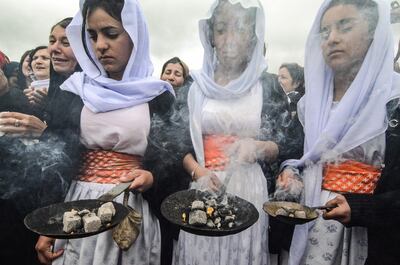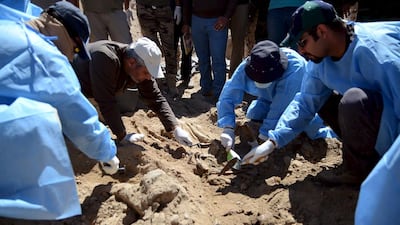The UN has taken a major step forward in its bid to work with the Iraqi government to accelerate ISIS genocide prosecutions.
In a crunch meeting this week, the UN’s head of ISIS war crimes, British lawyer Karim Khan, QC, met Iraqi Prime Minister Mustafa Al Kadhimi to discuss the next steps in the investigations.
Mr Khan's team has now identified nearly 350 terrorists behind the genocide of the Yazidis and other groups.
Using more than two million pieces of data from mobile phones, investigators have been able to place the ISIS members at the scenes of the atrocities.
Mr Khan said the team is at a “pivotal moment” in its work.
Despite the evidence, a major stumbling block to prosecutions has been Iraq’s legal system, which does not have a law covering the crime of genocide.
Now Mr Al Kadhimi, who was elected in May, has offered his support and “stressed the importance” of passing a law covering genocide to “strengthen national unity and prevent the recurrence of such atrocities”, his office said.
It comes a month after the exhumation of two mass Yazidi graves began.
The UN’s Investigative Team to Promote Accountability for Crimes Committed by ISIS, or Unitad, agreed in the meeting to help the Iraqi High Commission for Human Rights catalogue evidence relating to ISIS’s crimes.
“Mr Al Kazemi expressed his support for Unitad’s work and the need to ensure justice for all Iraqis,” the agency tweeted after the meeting.

“They agreed Unitad would help to enhance IHCHR’s capacity to archive and digitise evidence held related to ISIS crimes.
"Next steps for improving information sharing to Unitad were also agreed on.
“They discussed Unitad’s progress, including its support to the government on mass grave exhumations, archiving of ISIS-related evidence and capacity building of the judiciary to prosecute ISIS perpetrators of international crimes.”
Mr Khan earlier said: “We are trying to build case files that can be properly prosecuted and adjudicated in Iraq or in third states. We have victims and survivors who are waiting for justice.
“Our commitment to the communities of Iraq will only be satisfied when justice is delivered in court, when the survivors of ISIS atrocities are able to see their abusers held accountable in accordance with the rule of law, based on incontrovertible evidence collected in line with international standards.”
The data the team has collected so far has helped to locate suspects from the summer of 2014, when extremists killed and enslaved thousands of Yazidis in northern Iraq.
Mr Khan says the records provide evidence that is admissible in court and can prove criminal responsibility “beyond reasonable doubt".
The UN team is also working with Iraqi intelligence to extract data from mobile phones and mass storage devices, including hard drives.
They were left behind when ISIS members fled during operations to dislodge them from the northern city of Mosul in 2016 and 2017.
There are more than 200 mass graves containing up to 12,000 bodies in Iraq, which are attributed to ISIS.
The extremists were defeated late in 2017 after the battle for Mosul.
In October, Iraqi experts from the Mass Graves and Medico-Legal directorates started exhumations in the mass graves left by ISIS in Solagh and Kojo, Ninewa governorate.
More than 300 relatives of missing Yazidis attended the start of the work.


